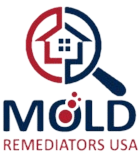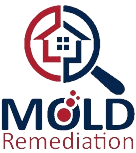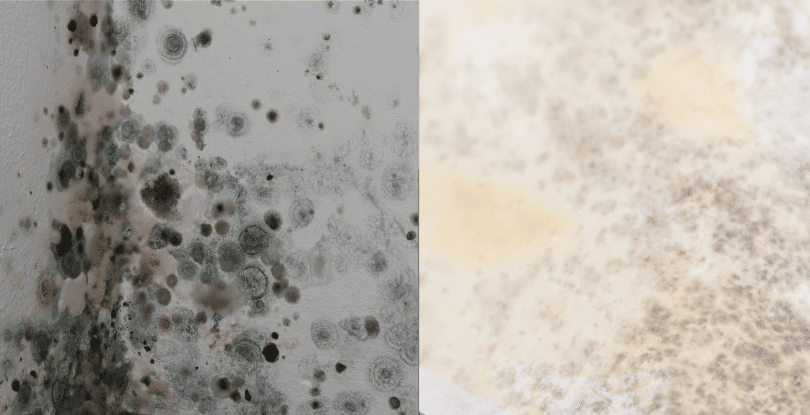Did you know vinegar can kill about 82% of all mold species? This simple household item can fight mold, which can cause breathing problems and serious illnesses. While big mold problems need experts, vinegar can help with small issues at home.
Mold loves warm, damp places like showers and dishwashers. The mold in homes can harm your health. But, not all vinegars work the same. Vinegar must have at least 4.0% to 4.2% acetic acid to kill mold.
Key Takeaways
- Distilled white vinegar and cleaning vinegar are the most effective types for killing mold, with 5% and 6% acetic acid respectively.
- Vinegar can kill over 82% of known mold species, making it a more effective solution than bleach.
- Vinegar takes about an hour to kill mold and may require additional scrubbing to remove discoloration and stains.
- Vinegar should not be used on certain surfaces like stone, wood, and electronics due to its acidity.
- For larger mold infestations over 10 square feet, it’s best to hire professional mold remediation services.
By choosing the right vinegar, you can fight mold in your home safely and effectively. Keep reading for more tips on using vinegar and other natural mold killers to keep your home healthy and mold-free.
Learn more about effective mold removal
Understanding the Dangers of Household Mold
Mold is a common problem in our homes. It causes health issues and damages structures. Knowing how mold spreads and its dangers is key to stopping it.
Mold Thrives in Warm, Damp Environments
Mold loves warm, dark, and damp places. Showers, dishwashers, and washing machines are perfect for it. Too much moisture, from leaks or high humidity, helps mold grow.
Cleaning regularly and keeping humidity in check are vital. This helps control mold growth causes.
Health Risks of Mold Exposure
Being around household mold can harm your health. It can lead to breathing problems like asthma and allergies. Touching or inhaling mold spores can cause coughing, sneezing, and eye irritation.
Long-term exposure can lead to lung infections and brain problems. It’s important to act fast when you see mold. This keeps your home safe and healthy.
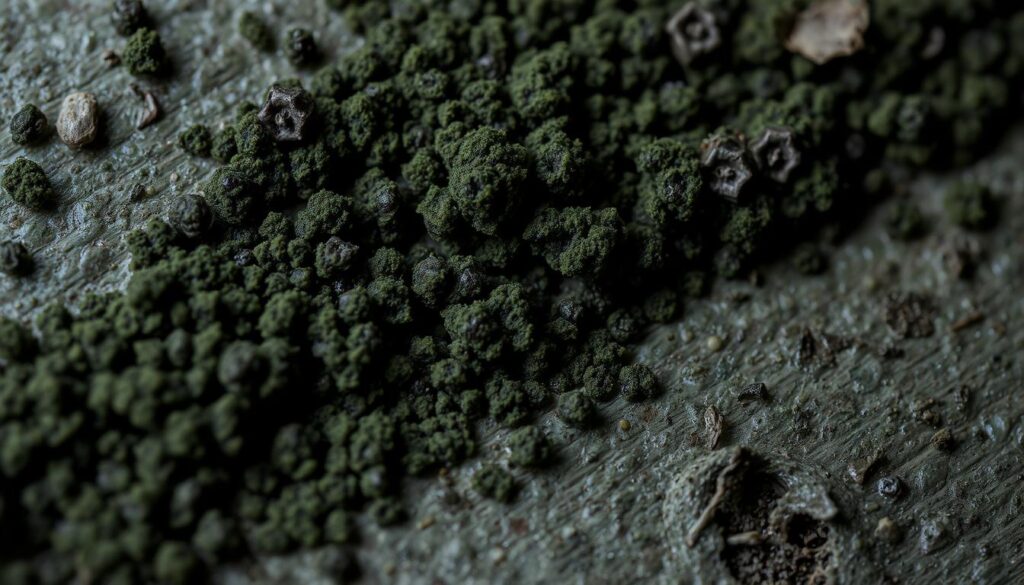
“Mold can cause a variety of health problems, from allergic reactions to more serious infections. It’s important to address any mold issues in your home as soon as possible.
The Effectiveness of Vinegar in Killing Mold
Many homeowners use vinegar to fight mold. But how does it compare to bleach? Vinegar is actually more effective than bleach in killing mold.
Vinegar’s acetic acid is a strong biocide. It can damage mold’s proteins, enzymes, and DNA. This makes vinegar great at killing over 82% of mold species, including black mold. Bleach, on the other hand, only kills surface mold and loses power when it touches organic stuff.
Vinegar can also get into wood and kill mold under the surface. This is something bleach can’t do. Plus, vinegar is better for the environment and saves money, making it a top choice for many.
| Vinegar | Bleach |
|---|---|
| Kills over 82% of mold species | Only kills surface-level mold |
| Penetrates porous materials to kill underlying mold | Limited to surface-level mold removal |
| More eco-friendly and cost-effective | Loses efficacy when exposed to organic materials |
While vinegar is a strong mold killer, using it safely is key. Use undiluted white vinegar and clean and dry the area well to stop mold from coming back. For big mold problems, getting help from pros like Mold Remediation USA is a good idea.
What Type of Vinegar Kills Mold
Not all vinegars are the same when it comes to fighting mold. Cleaning vinegar, with about 6% acetic acid, is the best choice. White vinegar, with 5% acidity, also works well against mold. Vinegars with more acetic acid are more effective at killing mold.
But, vinegar can be harsh on some surfaces. It might damage aluminum, cast iron, waxed wood, or natural stone. If you have these surfaces, choose a milder cleaner or get professional help.
| Type of Vinegar | Acidity Level | Mold-Killing Effectiveness |
|---|---|---|
| Cleaning Vinegar | 6% Acetic Acid | Highly Effective |
| White Vinegar | 5% Acetic Acid | Effective |
| Apple Cider Vinegar | 5-6% Acetic Acid | Moderately Effective |
| Red Wine Vinegar | 4-7% Acetic Acid | Moderately Effective |
Knowing the differences in vinegar types helps you pick the best vinegar for killing mold at home. The more acidic the vinegar, the better it is at getting rid of mold.
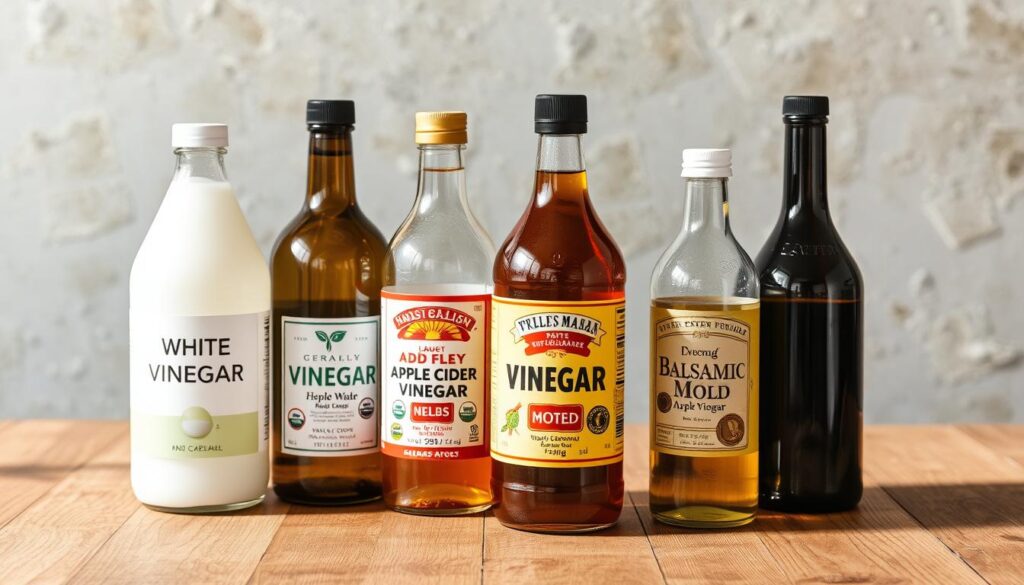
Step-by-Step Guide to Using Vinegar for Mold Removal
Mold can be a big problem in homes, but vinegar can help get rid of it. This guide will show you how to safely remove green, black, or white mold dots. You’ll learn how to keep it from coming back.
Safety Precautions
First, make sure you’re safe. Mold spores can be harmful, so wear a N-95 respirator mask, rubber gloves, and goggles. This gear protects you from mold during cleaning.
Applying Vinegar to the Moldy Area
Begin by spraying the moldy area with undiluted white vinegar. Let it sit for at least an hour. Vinegar’s acetic acid kills mold naturally, without harsh chemicals.
Creating a Baking Soda Scrub
Then, mix baking soda and water in a spray bottle. Spray this solution on the mold and scrub with a soft brush. This removes any leftover mold and stains.
Scrubbing Away Remaining Mold
The baking soda scrub gets rid of tough mold. Scrub well to cover all moldy areas. This ensures all mold is gone.
Final Vinegar Application
After scrubbing, spray the area with vinegar again. This kills any remaining mold spores. Let it dry before using the area again.
Using vinegar and baking soda can safely remove mold from your home. Keep your home well-ventilated and control humidity to stop mold from coming back. If mold keeps coming back, get professional help.

Vinegar as a Preventative Measure
Instead of waiting for mold to grow, use vinegar to stop it before it starts. In places like bathrooms and laundry rooms, where it’s warm and damp, use vinegar to clean. Keep a vinegar spray in the bathroom and spray it on the shower after each use. Or, mix vinegar with water to mop floors and stop mold from growing.
Vinegar can kill 82% of mold species, making it a great tool against mold. By cleaning with vinegar often in areas where mold likes to grow, you can kill spores and stop new ones from forming. This is especially key in humid places where mold loves to grow.
To keep mold away, make sure air flows well, don’t clutter, and fix any water damage fast. Using a dehumidifier in humid rooms can also help prevent mold. With a vinegar cleaning routine and some extra steps, you can keep mold at bay and avoid expensive fixes later.
Learn more about using vinegar to prevent.
Regularly spraying vinegar on mold-prone surfaces can help prevent mold formation and kill existing mold spores.
| Mold Prevention Strategies | Benefits |
|---|---|
| Regular vinegar-based cleaning | Kills 82% of mold species and discourages future growth |
| Maintaining good airflow and limiting clutter | Reduces moisture buildup that fuels mold |
| Investing in a dehumidifier | Lowers humidity levels in mold-prone areas |
| Promptly addressing water damage | Prevents mold from taking hold within the first 24-48 hours |
Other Natural Mold Killers
Vinegar is great for killing mold, but other household items can also work. These items disrupt mold’s cells or make it hard for mold to grow. But, some like bleach and ammonia need extra care because they’re very strong.
Hydrogen peroxide can kill mold on different surfaces. Rubbing alcohol is another strong option for mold removal. Baking soda, or sodium bicarbonate, is good for scrubbing away mold.
Borax, a natural mineral, is a good mold killer when mixed with water. Ammonia can also kill mold, but you need to ventilate well and wear protective gear.
Dish soap can help remove mold by breaking it down. Tea tree oil and grapefruit seed extract are also natural options that work well against mold.
While natural remedies can be helpful, they might not work for big mold problems or hidden mold. For these cases, it’s best to call a professional mold remover. They have the right tools and knowledge to get rid of mold for good.
When to Seek Professional Help
Knowing when to call experts for mold is key. For big mold problems over 10 square feet, get professional help. They have the right tools and know-how to fix big mold issues and find the cause.
Trying to fix big mold problems yourself can be dangerous. It might make the mold worse or come back. Signs of a major mold problem include big mold spots, a strong musty smell, and health issues in your family.
When to call a mold remediation company is very important for your family’s safety. These pros have the right training and gear for safely conducting large-scale mold cleanup. They stop mold from spreading and protect your home.
For significant mold infestations, it’s best to call in professional mold remediation experts. They have the expertise and resources to properly address the problem.”
While vinegar and natural solutions work for small mold, big problems need experts. Don’t wait to get help to keep your home safe and healthy for everyone.
Conclusion
White distilled vinegar is a great natural way to fight mold at home. It has acetic acid that kills over 82% of mold, including black mold. Vinegar is stronger than bleach and can reach mold deep in surfaces.
To use vinegar for mold, just follow a few steps. Mix it with water for small to medium mold. But for big mold problems, get help from mold experts. They can fix it right and for good.
Using vinegar for mold has many benefits. It works better than store-bought cleaners. Always ventilate and wear gloves when using vinegar. For big mold, experts are needed. Vinegar can make your home safe and healthy again.
FAQ
What types of vinegar are effective for killing mold?
Cleaning vinegar, with 6% acetic acid, is the best for killing mold. White vinegar, with 5% acidity, also works well. The higher the acidity, the stronger the vinegar is against mold.
How does vinegar kill mold?
Vinegar’s acetic acid is a strong killer of mold. It messes with mold’s proteins, enzymes, and DNA. This makes it effective against over 82% of mold species.
Is vinegar more effective than bleach for mold removal?
Yes, vinegar is better than bleach at killing mold, including black mold. Vinegar can reach mold in wood, unlike bleach which only kills surface mold.
How do I use vinegar to remove mold?
First, wear a mask, gloves, and goggles to protect yourself. Spray vinegar on the mold and wait for an hour. Then, make a baking soda scrub to clean the area.
Finally, spray vinegar again to kill any remaining mold and stop it from coming back.
Can I use vinegar to prevent mold growth?
Yes, vinegar can help prevent mold. Use it in damp places like bathrooms and laundry rooms. Spray vinegar on these areas after each use.
Are there any other natural mold killers besides vinegar?
Yes, other household items can kill mold too. Hydrogen peroxide, rubbing alcohol, ammonia, baking soda, borax, and dish soap can all work. They disrupt mold’s structure or physically remove it.
When should I call a professional for mold removal?
If you have a big mold problem, over 10 square feet, call a pro. Experts have the right tools and know-how to handle big mold jobs. They can also fix the moisture issues that caused the mold.
